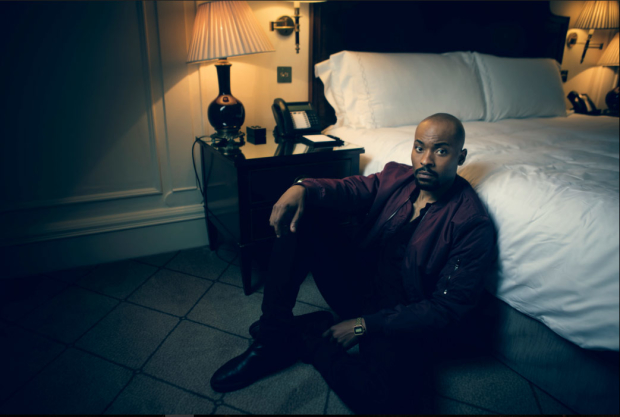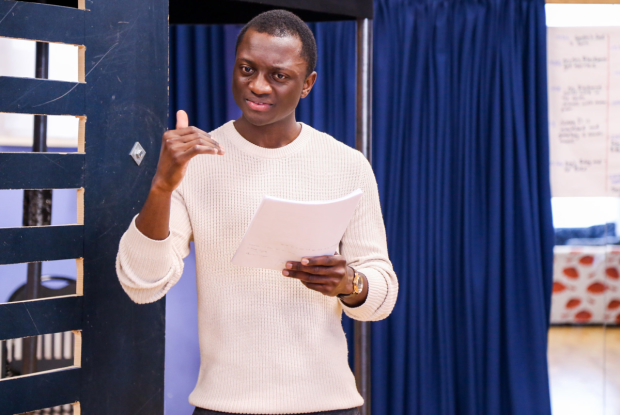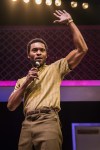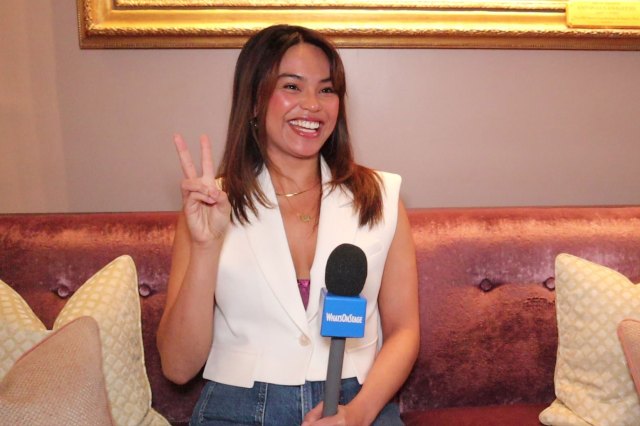Arinzé Kene: 'I realised I had stories to tell'
”The Pass” actor on what made him turn to playwriting, his latest piece and his terrible hoop dreams

© Will Bremridge
Arinzé Kene is something of a polymath. He has just won the Evening Standard Award for Best Supporting Actor for his role opposite Russell Tovey in the film The Pass, he's also just starred as legendary singer Sam Cooke at the Donmar Warehouse, and he's just been on TV in the new series Crazyhead. He's also just written his fifth play, Good Dog which will open at Watford Palace next week. But, it turns out, Kene's secret desire is to be a basketball player. The 29 year-old's acting and writing career is blossoming, but, he says when I meet him to chat about Good Dog, he still has a severe case of 'Hoop Dreams'.
Good Dog was inspired by the riots, is that right?
In 2011, during the Tottenham riots, I was rehearsing a play by Lynn Nottage. I wanted to go and see and feel what was happening at the time, but I was in rehearsals, so instead, I made a lot of notes about what I was feeling and what was happening. Then in 2014 I was able to look over those notes and that's how Good Dog came about.
What were your initial reactions to the riots?
It felt like it was coming. London was split – our nation was, but specifically London. Half of the city thought: 'Wow this is a shock' and the other half thought: 'This was coming'. People were stressed out at the time, it didn't come as a surprise. It was devastating that another young black man had died at the hands of the police, and there was this foresight that nothing would be done about it.
What is the play about?
Good Dog is about the boy who follows the old cultural western platitude that we all believe in growing up: that good things will happen to good people. We go on a journey with him where he realises that it's actually more complex than that. It's a one-man show and he tells the story through personal experience and through his community. It basically asks whether being a good dog means you will really get your treat at the end of the day.

© Wasi Daniju
What made you want to start acting?
I was 13 and on my way to basketball training in the summer and it started to pour down. I ducked into the nearest place, which happened to be a theatre – the Arcola Theatre in east London. I discovered a young theatre company in there – I was interested in the fact that there were loads of girls my age there – and I spent the day with them. I didn't go back over the summer, even though they asked me to, but I did go back to watch their play. The thing that made me want to be an actor was the fact that I saw how all the people in the group had grown and changed. I also liked the fact that they all remembered me, they showed signs they had missed me.
So no more basketball?
I was playing basketball last night and watching it this morning. People used to call me basketball head when I was in school. I never came into school without a basketball. I lived and breathed it and even now I still have dreams that I am in the NBA. I have a recurring dream that there's a free throw and I'm about to take it. There's actually a basketball term for [having dreams like that]. It's called a Hoop Dream.
What made you first want to write a play?
I remember doing some acting classes and I spoke to a few actors and we were all saying somebody should really write something about this, and this, and this. Then everyone went home and I thought: 'None of us are going to do anything.' I realised that I had some stories to tell and that I needed to tell them and to write.
You've been very successful in both writing and acting, will there ever be a point where you have to chose one or the other?
It's been tricky. Last year was hard. My agent and I didn't space things out properly, but this year we have organised pockets of space so I can write.
It's been a while since your last play, why's that?
It has been four years, and it's taken so long because of television. I was writing for television and I was performing. I started to develop things for the silver screen and television screen.
What was it like winning the Evening Standard Film Award for Best Supporting Actor?
It's the best feeling in the world. You don't work for awards or for people to love it, we are far too focused on portraying the character. But when it comes out and people love it, it's a great thing. I would love for everybody to see The Pass, because it's a really important film. It's been nominated for a BAFTA now too.
There have been a huge number of high profile protests across the world recently, does Good Dog feel very relevant?
I was playing Sam Cooke on the Donmar Warehouse stage the afternoon when Trump was elected. The play is set in 1964 and is about racial injustice and discrimination and in it Cooke sings "A Change is Gonna Come". And it really doesn't feel like we've come that far. Good Dog is very relevant with Brexit and all this turmoil. It is what I want to say about the world, it's a slice of what I think.
Good Dog runs at Watford Palace Theatre from 17 to 18 February, with previews from 14 February, and then tours the UK.













